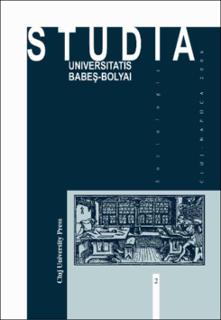Please use this identifier to cite or link to this item:
https://doi.org/10.21256/zhaw-4321| Publication type: | Article in scientific journal |
| Type of review: | Peer review (publication) |
| Title: | Die Evaluierung der Hauskrankenpflegedienste der Caritas: Entwicklung, Zielsetzungen und Methoden |
| Authors: | Roth-Szamoskozi, Maria Mezei, Elemér Haragus, Paul-Teodor Berszan, Lidia Haragus, Mihaela Kösler, Edgar Steinebach, Christoph Rebeleanu, Adina Rusu, Dan Diaconescu, Maria Szabo, Béla Oanes, Christina |
| DOI: | 10.21256/zhaw-4321 |
| Published in: | Studia Universitatis Babes-Bolyai Sociologia |
| Volume(Issue): | 51 |
| Issue: | 2 |
| Page(s): | 69 |
| Pages to: | 93 |
| Issue Date: | 2006 |
| Publisher / Ed. Institution: | De Gruyter |
| Publisher / Ed. Institution: | Cluj-Napoca |
| ISSN: | 2066-0464 1224-8703 |
| Language: | German |
| Subjects: | Häusliche Pflege; Versorgungsqualität; Evaluation; Klientenzufriedenheit; Altenpflege; Caritas; Osteuropa; Rumänien |
| Subject (DDC): | 361: Social work and welfare 362: Health and social services |
| Abstract: | Caritas is one of the best known charity organizations active in Europe. Established in Romania immediately after the political shift in 1990, it developed services for the needy in different areas of Romania, among them a large network of medical home-care for dependent people (elderly, sick and with disabilities). At the request of Caritas International, the main founder of the Romanian Caritas home-care services, the Department of Social Work (Babes-Bolyai University) has evaluated the project from the point of view of clients, their relatives/helpers, the professionals working within Caritas, and outside collaborators, including volunteers. Data were gathered by questionnaires with closed and open ended questions and interviews. In these pages we present the data gathered on a sample of 826 (out of the total of 8000) cared for people and their family members (564 respondents). The answers of these groups were compared. The cared-for people are in majority elderly people, women (71%), roman-catholic (59%), pensioners (83%), many with the caring family members/or the helpers pensioners themselves (44%). The quality of life and housing are generally poor, especially for those living in rural areas, which represent 41% of the clients. The average income is 63 Euro, while 50% have less then 50 Euro and 25% less then 38 Euro/month. Both the clients and their helpers are very much satisfied with the home-care services offered by Caritas and consider them respectful, honest, competent, serious, friendly and optimist. They also report that the cared-for people feel much better, or better duet o the care received. Relatives/helpers appreciate they have some more free time and also feel understood by professionals. Though very appreciative, clients and family members expect more help for themselves, especially medication and financial means, as well as more time spent by their side, offering some entertainment. What is important from the point of view of administration is that the majority of the dependent persons considered home care as being better for them compared to that received in the hospital. This shows the need to extend the home-care services to more clients, served with a larger area of services. In a following article we shall also present the analysis of the organizational structure and status-quo of the care-force of this service, as well as its fit within the actual socio-medical service system of Romania. |
| URI: | https://digitalcollection.zhaw.ch/handle/11475/7003 |
| Fulltext version: | Published version |
| License (according to publishing contract): | CC BY-NC-ND 4.0: Attribution - Non commercial - No derivatives 4.0 International |
| Departement: | Applied Psychology |
| Organisational Unit: | Institute of Applied Psychology (IAP) Psychological Institute (PI) |
| Appears in collections: | Publikationen Angewandte Psychologie |
Files in This Item:
| File | Description | Size | Format | |
|---|---|---|---|---|
| 2006_Steinebach_Christoph_Evaluierung_der_Hauskrankenpflegedienste_der_Caritas.pdf | 1.32 MB | Adobe PDF |  View/Open |
Show full item record
Roth-Szamoskozi, M., Mezei, E., Haragus, P.-T., Berszan, L., Haragus, M., Kösler, E., Steinebach, C., Rebeleanu, A., Rusu, D., Diaconescu, M., Szabo, B., & Oanes, C. (2006). Die Evaluierung der Hauskrankenpflegedienste der Caritas: Entwicklung, Zielsetzungen und Methoden. Studia Universitatis Babes-Bolyai Sociologia, 51(2), 69–93. https://doi.org/10.21256/zhaw-4321
Roth-Szamoskozi, M. et al. (2006) ‘Die Evaluierung der Hauskrankenpflegedienste der Caritas: Entwicklung, Zielsetzungen und Methoden’, Studia Universitatis Babes-Bolyai Sociologia, 51(2), pp. 69–93. Available at: https://doi.org/10.21256/zhaw-4321.
M. Roth-Szamoskozi et al., “Die Evaluierung der Hauskrankenpflegedienste der Caritas: Entwicklung, Zielsetzungen und Methoden,” Studia Universitatis Babes-Bolyai Sociologia, vol. 51, no. 2, pp. 69–93, 2006, doi: 10.21256/zhaw-4321.
ROTH-SZAMOSKOZI, Maria, Elemér MEZEI, Paul-Teodor HARAGUS, Lidia BERSZAN, Mihaela HARAGUS, Edgar KÖSLER, Christoph STEINEBACH, Adina REBELEANU, Dan RUSU, Maria DIACONESCU, Béla SZABO und Christina OANES, 2006. Die Evaluierung der Hauskrankenpflegedienste der Caritas: Entwicklung, Zielsetzungen und Methoden. Studia Universitatis Babes-Bolyai Sociologia. 2006. Bd. 51, Nr. 2, S. 69–93. DOI 10.21256/zhaw-4321
Roth-Szamoskozi, Maria, Elemér Mezei, Paul-Teodor Haragus, Lidia Berszan, Mihaela Haragus, Edgar Kösler, Christoph Steinebach, et al. 2006. “Die Evaluierung der Hauskrankenpflegedienste der Caritas: Entwicklung, Zielsetzungen und Methoden.” Studia Universitatis Babes-Bolyai Sociologia 51 (2): 69–93. https://doi.org/10.21256/zhaw-4321.
Roth-Szamoskozi, Maria, et al. “Die Evaluierung der Hauskrankenpflegedienste der Caritas: Entwicklung, Zielsetzungen und Methoden.” Studia Universitatis Babes-Bolyai Sociologia, vol. 51, no. 2, 2006, pp. 69–93, https://doi.org/10.21256/zhaw-4321.
Items in DSpace are protected by copyright, with all rights reserved, unless otherwise indicated.